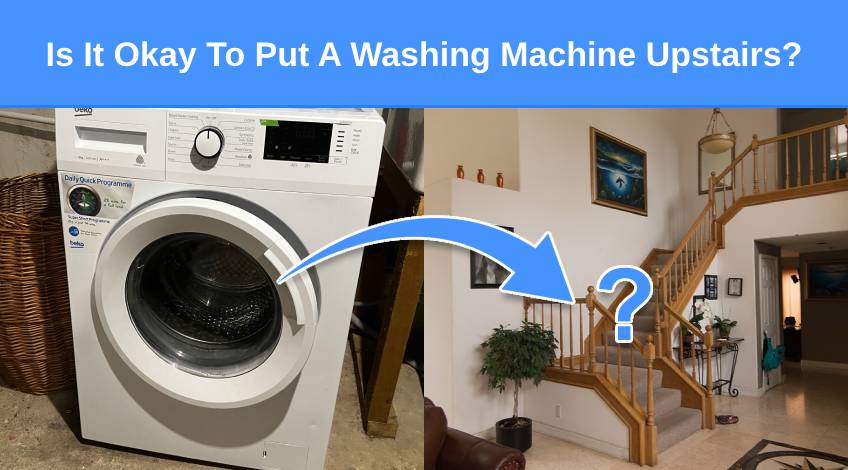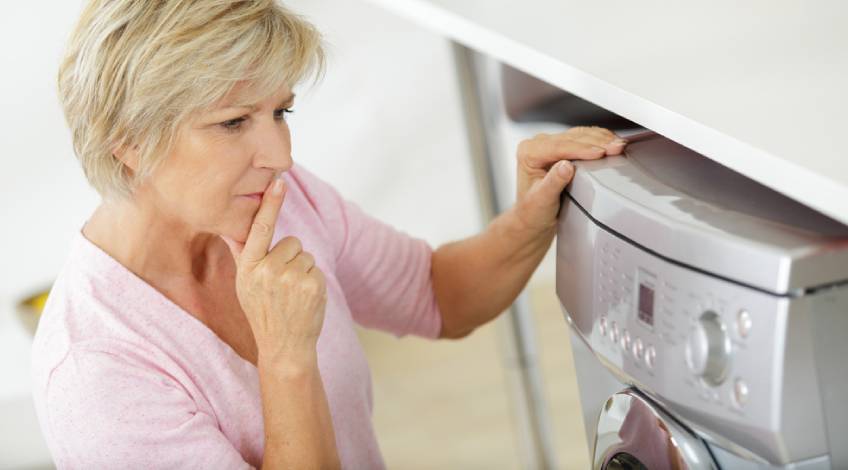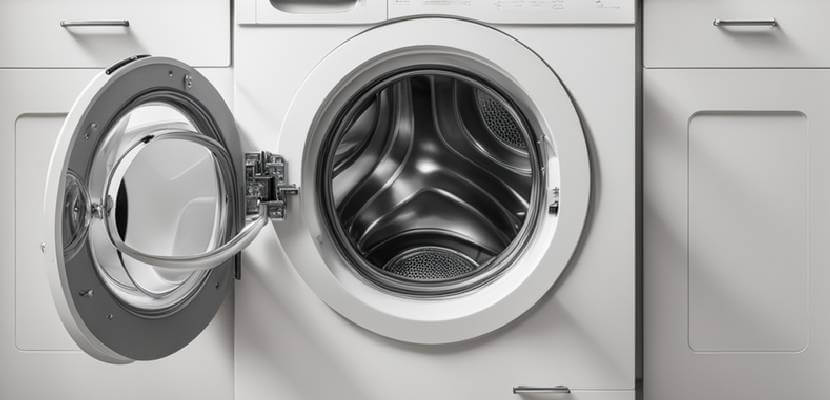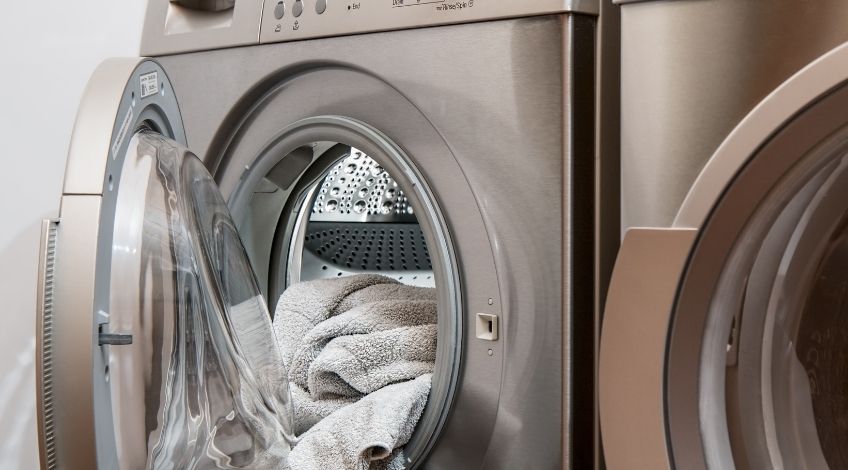
Is It Okay To Put A Washing Machine Upstairs? (here’s what you need to know)
The most common place for a washing machine is downstairs in most homes in the UK. However, this is not the case in much of Europe where having washing machines on the second level of the home is commonplace.
If your home is short on available space, and you want to get a dishwasher for the kitchen, moving the washing machine to an upstairs room might seem like a viable option. Before you make a decision, keep reading.
In this article I take a close look at all of the reasons for and against putting a washing machine in an upstairs room.
What Are The Pros & Cons Of Having A Washing Machine Upstairs?

To help you make an informed decision, let’s take a look at all of the benefits and disadvantages of having a washing machine upstairs.
What Are The Benefits Of Having A Washing Machine Upstairs?
The advantages of having a washing machine upstairs include;
- It Frees Up Space Elsewhere
If your home doesn’t have a utility room, the washing machine is most likely in the kitchen. This often means there’s no room for a dishwasher in the same room. Putting the washing machine upstairs frees up space in the kitchen allowing you to get a dishwasher installed. - No Need To Lug Dirty Laundry Around The Home
Most laundry is carried from upstairs to the washing machine that’s downstairs. This duty usually falls on one person who has to do all of that extra walking and carrying. If the washing machine is upstairs, all of the laundry including bed sheets, duvets etc need only be moved across the hall and not up and down stairs. - No Need For Wash Bins in Every Bedroom
If the washing machine is upstairs, there’s no need for a wash basket or hamper in every room. All of the dirty laundry can be placed directly into the area where the washer is. - It Saves Time
As you no longer need to carry dirty laundry down from each bedroom, you will spend less time gathering the laundry and lugging it around the home.
What Are The Disadvantages Of Having A Washing Machine Upstairs?
The disadvantages of having a washing machine upstairs include;
- You Might Still Need To Carry Wet Laundry Around
Just because the washing machine is upstairs, it doesn’t mean the clothes can be dried upstairs as well. If you air dry your laundry on a washing line, the chances are the line is in the garden, downstairs. Which means you’ll need to carry all of that wet laundry downstairs and out to the garden to dry it. - A Noisy Washing Machine Could Prevent Sleeping
If you take advantage of off peak electricity, it probably means running the washing machine late at night or very early in the morning. If the machine is upstairs, the noise could prevent light sleepers from sleeping. - Wooden Floors Accentuate Vibrations
The floors upstairs in many homes are made from wood. When a washing machine is running it creates vibrations, those vibrations are often not even registered because the washer is on solid ground (like a concrete floor), with wooden floors, those vibrations will be evident and quite loud too. - It Takes Effort & Strength To Get The Appliance Upstairs
Washing machines are typically heavy, bulky appliances. This makes them difficult enough to move on level ground. Transporting the washer upstairs can be difficult and dangerous unless you’re careful. Either way, it’ll definitely take more than one person to get the washer upstairs. - Any Potential Leaks Will Cause More Damage
With any appliance that uses water there’s the potential for leaks and washing machines are no exception. However, if a washer leaks on the ground floor, it is usually on a concrete floor and does little damage and is easy to clean up. Upstairs leaks are not only on wooden floors which could cause permanent damage, but the water can travel further damaging ceilings and walls as it goes. - It Ties Up Space Upstairs
Unless you live in a mansion, the most common complaint we hear is the home is too small. Putting the washing machine upstairs, ties up space that could be used for something else. Remember it’s not just a case of the washer fitting in the allocated space, you need to allow some space around it for maintenance work, cleaning etc. Plus you need enough space to comfortably load and unload the washer. - Installation Costs Could Be High
In a typical home, the electrics and pipework are all in place in a kitchen. Moving the washing machine upstairs often entails running new water supply pipes, drainage pipes and electricity supplies. All of which costs money and should only be done by a professional. - Upstairs Laundry Rooms Can Become Hot In Summer
Washing machines produce heat when operating which could cause the room the appliance is in to become hot. If you put a tumble dryer in the same room, that increases the amount of heat produced. This might not be problematic in colder winter months, but can be uncomfortable during the warmer summertime.
Tips For Putting A Washing Machine Upstairs

I’ve just highlighted some potential problems which you may encounter if you put a washing machine upstairs. Below are a few tips to help reduce the risks involved with these problems.
Get A Water Shut Off valve Installed
You should have a water shut off valve installed so that you can turn off the water supply as soon as the machine has finished. This will eliminate the risk of your home flooding.
You could also get an electric valve shut off kit installed. This has a sensor that is placed under the appliance and detects any water from a leak or flooding and shuts off the water supply.
Replace The Standard Hoses With Steel Braided Hoses
Washing machine hoses are typically made from rubber which has the potential to wear which can lead to cracks or splits and cause water leaks. By replacing the rubber hoses with stronger, stainless steel braided hoses you reduce the risk of water damage to your home.
Place The Washer On A Drain Pan
By placing your washing machine on a drain pan, you will prevent any water that might leak from the appliance from travelling through the floor.
Many also have a connector to allow you to get a drain hose fitted to drain away any water that leaks or is accidentally spilled when using the appliance.
Use Anti-Vibration Mats
- ✔ Easy to install----No tools or adhesives needed. Simply pop the four rubber dampers under the corners of any washing machine, dishwasher, tumble drier or other noisy appliance,you will never again have to deal with loud noises and vibrations. Please Keep the ground dry to prevent slipping when using these pads
- ✔ Prevent damage to flooring---The non slip rubber floor pads have good protection for wood floor and tile floor. Keep vibrations, noise and floor marks to a minimum with these highly efficient anti walk feet, and helps to protect the home appliances from scratches or quick wear bottom
By placing anti-vibration feet, pads or mats under the washing machine you will reduce the noise the machine makes as it operates on wooden floors.
The pads will also reduce the machine’s tendency to “walk” across the room due to vibrations.
How To Move A Washing Machine Upstairs

If you decide to go ahead with moving your washing machine upstairs you will need to get a friend to help you.
You Will Need;
- A Dolly (trolley)
- A Strong Strap
- Tracks (for the stairs)
- 2 People
Method:
- Place the washing machine on the dolly
- Strap it securely in place
- Place the tracks on the stairs
- With one person at the bottom of the dolly, and the other at the top, slowly and carefully move the appliance up the stairs.
Can You Put A Washing Machine Upstairs?
As you can see it is possible to put a washing machine upstairs as long as you take the necessary precautions. In fact, more and more homes are installing laundry rooms upstairs to increase floor space on the ground floor level and make better use of wasted space upstairs.
This allows you to save time on laundry days and prevent you from having to carry dirty laundry all around the home. As well as reducing the need for separate wash baskets in every bedroom.
However, it can be an expensive business running water, drainage and electricity connections to an upstairs room. Plus there’s more potential for flooding and water damage, more noise and extra vibration if you install a washer upstairs.
Not forgetting the effort needed to physically get the appliance up to the second floor. However, if you can manage to find a way around all of these obstacles, it might be beneficial to have your washing machine upstairs.
SEE ALSO: Can You Put A Washing Machine In A Garage?
Frequently Asked Questions
Having a laundry room upstairs on the second floor of your home has advantages and disadvantages. It will mean you don’t need to lug dirty laundry around your home, and allows you extra space downstairs for installing a dishwasher for example. But it can cause extra noise, produce more vibration, increase the potential for flooding and you will need to pay for moving water and drainage pipes as well as electricity to the upstairs space.
There’s no reason why you cannot have a washing machine upstairs in the UK as long as you have all of the correct pipework and electricity supply in place.
Washing machines are usually downstairs because that’s where the water supply and drainage are. However, it is not impossible to put a washing machine upstairs if you have the space and the correct water pipes and drainage systems in place.





